KDE wydało Aplikacje KDE 18.08.0
16 sierpnia 2018. Dzisiaj KDE wydało Aplikacje 18.08.0
We continuously work on improving the software included in our KDE Application series, and we hope you will find all the new enhancements and bug fixes useful!
Co nowego w Aplikacjach KDE 18.08
System
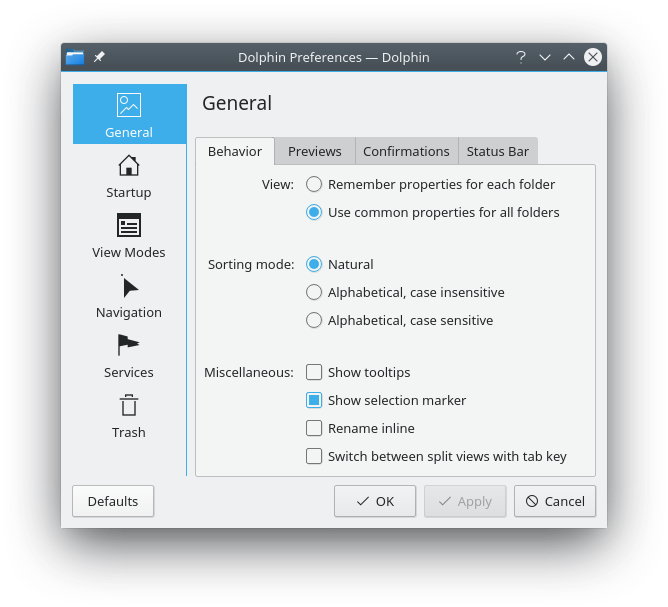
Dolphin, potężny menedżer plików KDE, otrzymał różne ulepszenia:
- The 'Settings' dialog has been modernized to better follow our design guidelines and be more intuitive.
- Various memory leaks that could slow down your computer have been eliminated.
- 'Create New' menu items are no longer available when viewing the trash.
- The application now adapts better to high resolution screens.
- The context menu now includes more useful options, allowing you to sort and change the view mode directly.
- Sorting by modification time is now 12 times faster. Also, you can now launch Dolphin again when logged in using the root user account. Support for modifying root-owned files when running Dolphin as a normal user is still work in progress.
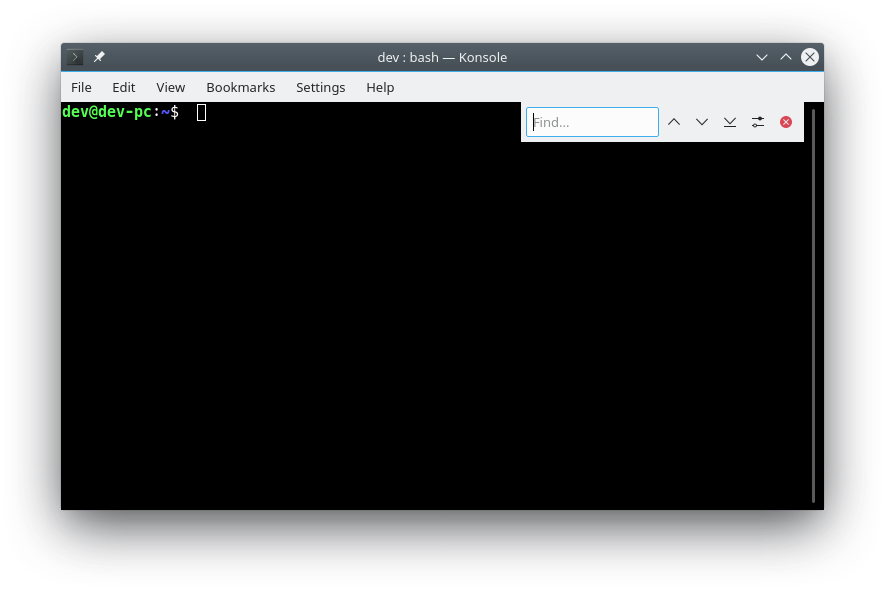
Multiple enhancements for Konsole, KDE's terminal emulator application, are available:
- The 'Find' widget will now appear on the top of the window without disrupting your workflow.
- Support for more escape sequences (DECSCUSR & XTerm Alternate Scroll Mode) has been added.
- You can now also assign any character(s) as a key for a shortcut.
Grafika
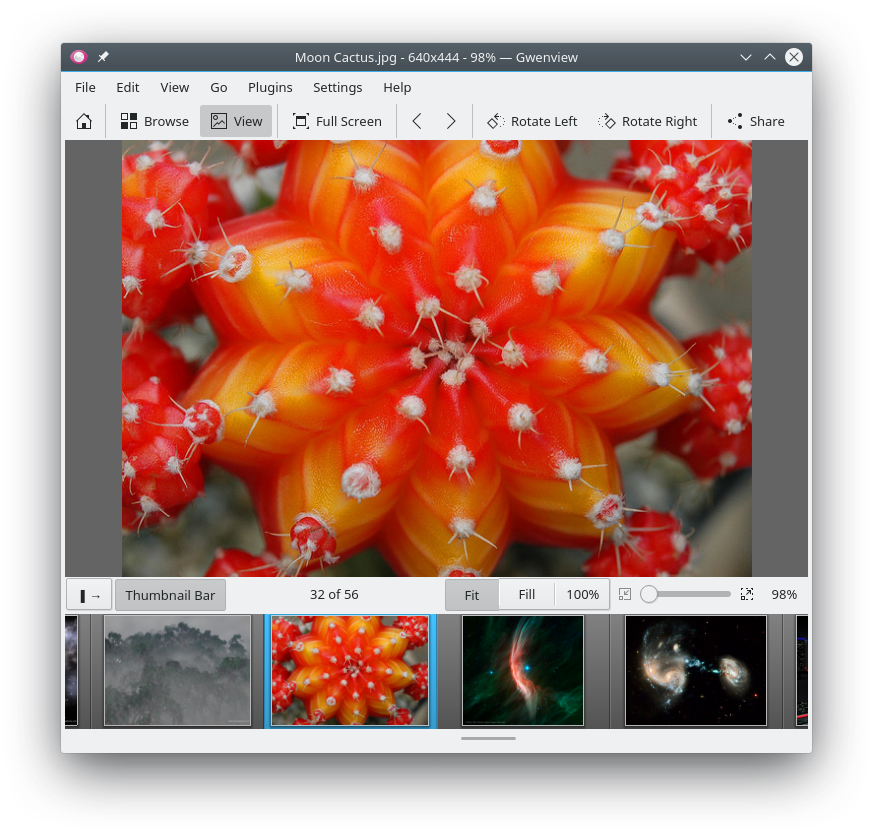
18.08 is a major release for Gwenview, KDE's image viewer and organizer. Over the last months contributors worked on a plethora of improvements. Highlights include:
- Gwenview's statusbar now features an image counter and displays the total number of images.
- It is now possible to sort by rating and in descending order. Sorting by date now separates directories and archives and was fixed in some situations.
- Support for drag-and-drop has been improved to allow dragging files and folders to the View mode to display them, as well as dragging viewed items to external applications.
- Pasting copied images from Gwenview now also works for applications which only accept raw image data, but no file path. Copying modified images is now supported as well.
- Image resize dialog has been overhauled for greater usability and to add an option for resizing images based on percentage.
- Red Eye Reduction tool's size slider and crosshair cursor were fixed.
- Transparent background selection now has an option for 'None' and can be configured for SVGs as well.
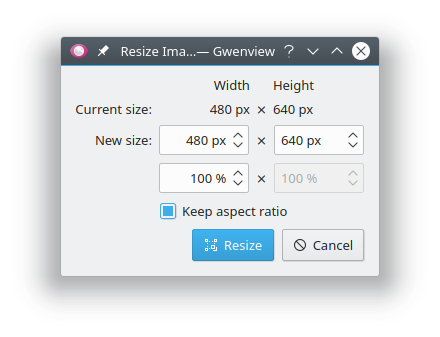
Image zooming has become more convenient:
- Enabled zooming by scrolling or clicking as well as panning also when the Crop or Red Eye Reduction tools are active.
- Middle-clicking once again toggles between Fit zoom and 100% zoom.
- Added Shift-middle-clicking and Shift+F keyboard shortcuts for toggling Fill zoom.
- Ctrl-clicking now zooms faster and more reliably.
- Gwenview now zooms to the cursor's current position for Zoom In/Out, Fill and 100% zoom operations when using the mouse and keyboard shortcuts.
Image comparison mode received several enhancements:
- Fixed size and alignment of the selection highlight.
- Fixed SVGs overlapping the selection highlight.
- For small SVG images, the selection highlight matches the image size.
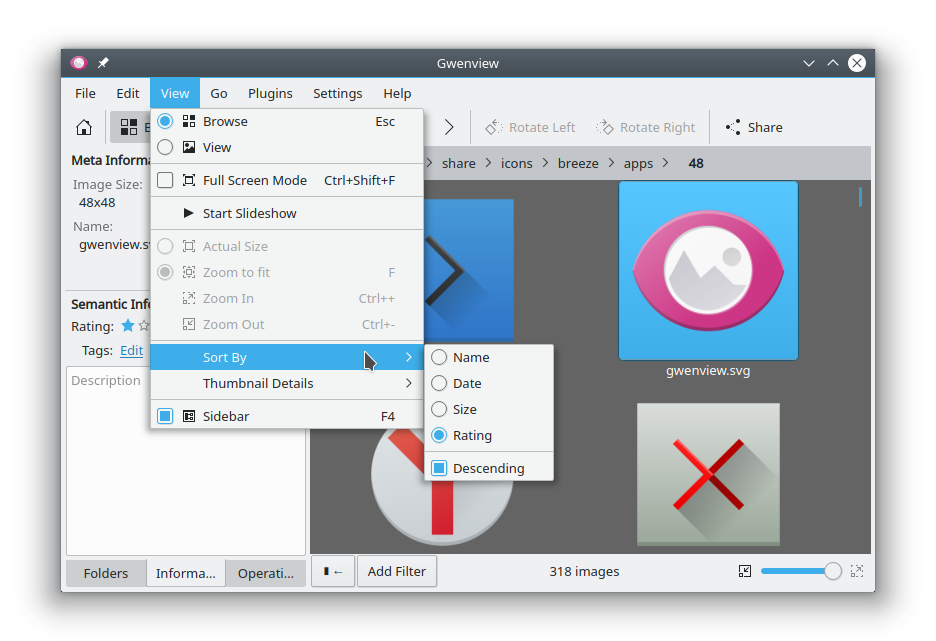
A number of smaller enhancements was introduced to make your workflow even more enjoyable:
- Improved the fade transitions between images of varying sizes and transparencies.
- Fixed the visibility of icons in some floating buttons when a light color scheme is used.
- When saving an image under a new name, the viewer does not jump to an unrelated image afterwards.
- When the share button is clicked and kipi-plugins are not installed, Gwenview will prompt the user to install them. After the installation they are immediately displayed.
- Sidebar now prevents getting hidden accidentally while resizing and remembers its width.
Biuro
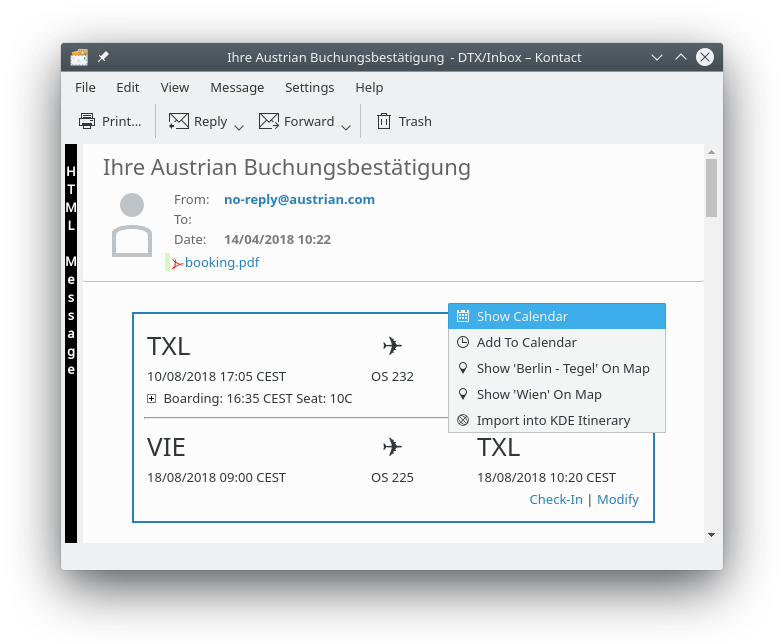
KMail, KDE's powerful email client, features some improvements in the travel data extraction engine. It now supports UIC 918.3 and SNCF train ticket barcodes and Wikidata-powered train station location lookup. Support for multi-traveler itineraries was added, and KMail now has integration with the KDE Itinerary app.
Akonadi, the personal information management framework, is now faster thanks to notification payloads and features XOAUTH support for SMTP, allowing for native authentication with Gmail.
Edukacja
Cantor, KDE's frontend to mathematical software, now saves the status of panels ("Variables", "Help", etc.) for each session separately. Julia sessions have become much faster to create.
User experience in KAlgebra, our graphing calculator, has been significantly improved for touch devices.
Narzędzia
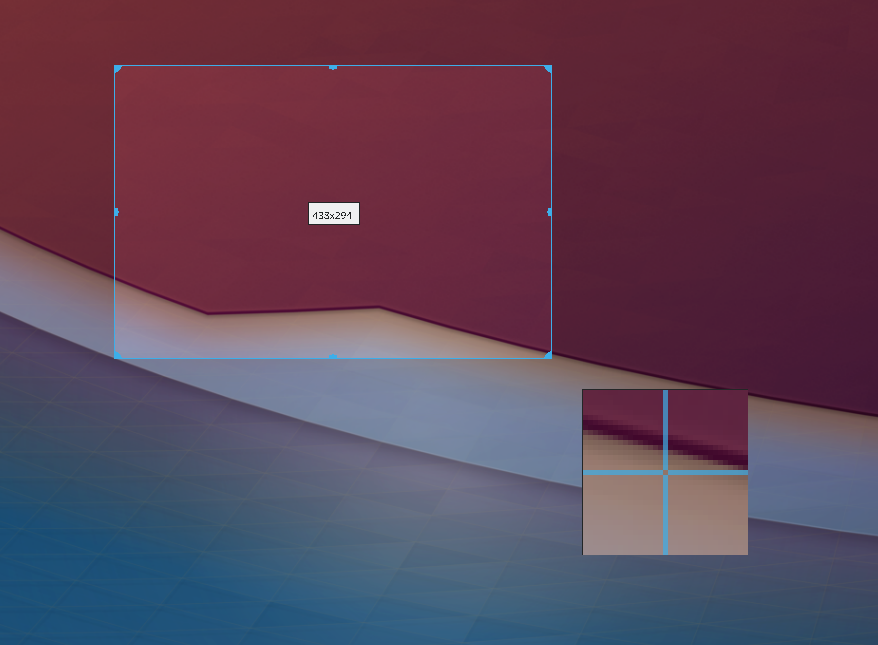
Contributors to Spectacle, KDE's versatile screenshot tool, focused on improving the Rectangular Region mode:
- In Rectangular Region mode, there is now a magnifier to help you draw a pixel-perfect selection rectangle.
- You can now move and resize the selection rectangle using the keyboard.
- The user interface follows the user's color scheme, and the presentation of the help text has been improved.
To make sharing your screenshots with others easier, links for shared images are now automatically copied to the clipboard. Screenshots can now be automatically saved in user-specified sub-directories.
Kamoso, our webcam recorder, was updated to avoid crashes with newer GStreamer versions.
Bug Stomping
More than 120 bugs have been resolved in applications including the Kontact Suite, Ark, Cantor, Dolphin, Gwenview, Kate, Konsole, Okular, Spectacle, Umbrello and more!
Pełny dziennik zmian
Pełną listę zmian można znaleźć tutajGłoś słowo
Non-technical contributors are an important part of KDE’s success. While proprietary software companies have huge advertising budgets for new software releases, KDE depends on people talking with other people. Even for those who are not software developers, there are many ways to support the KDE Applications release. Report bugs. Encourage others to join the KDE Community. Or support the nonprofit organization behind the KDE community
Please spread the word on the Social Web. Submit stories to news sites, use channels like delicious, digg, reddit, and twitter. Upload screenshots of your new set-up to services like Facebook, Flickr, ipernity and Picasa, and post them to appropriate groups. Create screencasts and upload them to YouTube, Blip.tv, and Vimeo. Please tag posts and uploaded materials with “KDE”. This makes them easy to find, and gives the KDE Promo Team a way to analyze coverage for this KDE Applications release.
Wgrywanie pakietów binarnych Aplikacji KDE
Pakiety
Niektórzy z dostawców systemów Linux/UNIX uprzejmie dostarczyli pakiety Aplikacji KDE dla niektórych wersji swoich dystrybucji, a w pozostałych przypadkach, zrobili to wolontariusze ze społeczności. Pakiety binarne, a także uaktualnienia, mogą stać się dostępne w nadchodzących tygodniach.
Położenie pakietów
Po bieżący wykaz dostępnych pakietów binarnych, o których Projekt KDE został powiadomiony, odwiedź Wiki Społeczności.
Budowanie Aplikacji KDE
Pełny kod źródłowy aplikacji KDE można pobrać nieodpłatnie z](https://download.kde.org/stable/applications/18.08.0/src)Polecenia do zbudowania i wgrania Aplikacji KDE są dostępne na 18.08.0 stronie informacyjnej Aplikacji KDE
Wspieranie KDE
KDE is a Free Software community that exists and grows only because of the help of many volunteers that donate their time and effort. KDE is always looking for new volunteers and contributions, whether it is help with coding, bug fixing or reporting, writing documentation, translations, promotion, money, etc. All contributions are gratefully appreciated and eagerly accepted. Please read through the Supporting KDE page for further information or become a KDE e.V. supporting member through our Join the Game initiative.
O KDE
KDE is an international technology team that creates free and open source software for desktop and portable computing. Among KDE’s products are a modern desktop system for Linux and UNIX platforms, comprehensive office productivity and groupware suites and hundreds of software titles in many categories including Internet and web applications, multimedia, entertainment, educational, graphics and software development. KDE software is translated into more than 60 languages and is built with ease of use and modern accessibility principles in mind. KDE’s full-featured applications run natively on Linux, BSD, Windows, Haiku, and macOS.
Uwagi do znaku towarowego.
KDE® oraz logo Środowiska Pulpitu K® są zarejestrowanymi znakami towarowymi KDE e.V..
Linux jest zarejestrowanym znakiem towarowym Linusa Torvaldsa. UNIX jest zarejestrowanym znakiem towarowym Otwartej Grupy w Stanach Zjednoczonych i innych państwach.
Wszystkie pozostałe znaki towarowe i prawa autorskie z tego ogłoszenia są własnością ich odpowiednich właścicieli.
Kontakt dla prasy
Po więcej szczegółów wyślij nam wiadomość: press@kde.org